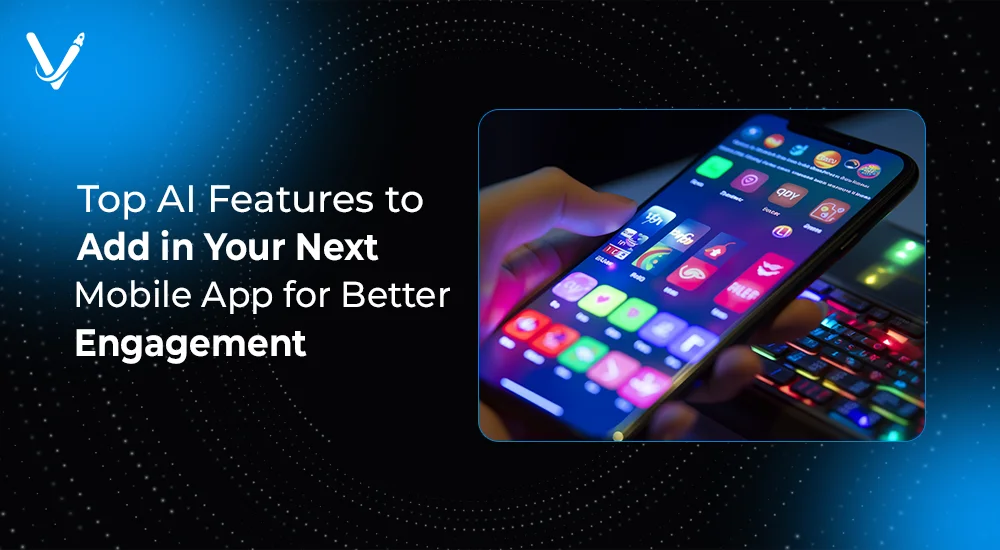Top AI Features to Add in Your Next Mobile App for Better Engagement


- Jul 7, 2025



Today’s mobile app users expect more than static screens and basic interactions. They crave personalized experiences, intelligent recommendations, and seamless conversations with digital assistants that feel natural. This is exactly where mobile app development services infused with Artificial Intelligence are creating a massive impact.
Brands that successfully adopt Artificial Intelligence App Development Services aren’t just adding trendy features — they’re transforming their apps into smart, adaptive solutions that keep users engaged longer and returning more frequently. Whether you want your app to deliver market predictions, power up customer support with Conversational AI Chatbots, or surprise users with hyper-personalized content, the AI wave is impossible to ignore.
In this comprehensive guide, we’ll unpack the most effective AI features you can weave into your next mobile app. You’ll see real-world examples, actionable insights, and practical steps to ensure your app isn’t left behind in an AI-first world.
Let’s dive into the future of mobile AI and how it can help create an app for your business that stands out.
AI in mobile apps isn’t a futuristic dream — it’s mainstream. According to Statista, the global AI software market is forecast to reach over $126 billion by 2025. Many top mobile applications today rely on AI for core functions.
What’s driving this surge?
Companies like Netflix, Spotify, and Amazon have proven that predictive analytics and AI-driven personalization lead to higher retention and revenue. So the question shifts from “How can I make an app?” to “How can I create a mobile application that learns and improves itself?”
Before jumping into specific AI features, it’s important to understand why AI matters so much for mobile apps:
Below are the top AI features that can transform your mobile app into a smarter, more engaging experience. Each one includes real-world examples and actionable tips.
Personalization is no longer optional — it’s expected. Users want apps that understand their preferences and offer tailor-made suggestions.
Example:
Spotify’s recommendation engine keeps listeners engaged by analyzing listening history and generating custom playlists.
How to implement:
Collect user data (likes, clicks, watch time).
Apply predictive analytics to forecast what users may like next.
Display dynamic content based on each user’s behavior.
Pro Tip: Start simple — even basic “Recommended for You” sections make a big impact.
Conversational AI Chatbots are revolutionizing customer support and user interaction in apps.
Example:
Duolingo’s AI-powered owl not only guides you through lessons but also chats in multiple languages to improve your fluency.
How to implement:
Define clear chatbot goals (support, FAQ, onboarding). Train your chatbot with real user questions.
Add fallback options for complex queries.
A well-designed chatbot can handle thousands of queries simultaneously, unlike human agents.
When an app can predict what a user wants, it feels magical. Predictive analytics processes historical data to forecast future actions.
Example:
Amazon’s recommendation engine anticipates what you’re likely to buy next based on your shopping history.
How to implement:
This is the backbone for texting apps that have AI predictive text, helping users type faster with smart suggestions.
AI-powered search goes beyond keyword matching. It understands context, synonyms, and user intent.
Example:
E-commerce apps like ASOS or Zalando use AI to suggest the right products even with vague queries.
How to implement:
Integrating voice technology adds a layer of convenience for busy users.
Example:
Google Assistant and Siri have made voice commands mainstream.
How to implement:
AI image recognition is becoming a must-have in retail, health, and home design apps.
Example:
IKEA’s app lets you point your camera at a room and visualize how furniture will look — an example of AI backyard design or exterior house renovation app capabilities.
How to implement:
Some advanced apps now adapt based on user emotions.
Example:
Gaming apps analyze facial expressions to adjust difficulty levels or deliver personalized rewards.
How to implement:
Security is critical for any app, especially those handling transactions.
Example:
Mobile banking apps use AI to detect suspicious transactions in real-time.
How to implement:
Predictive text is one of the oldest but still most powerful AI features for messaging apps.
Example:
Gboard and SwiftKey keyboards learn your typing habits and offer context-aware suggestions.
How to implement:
Apps with user-generated content need AI moderation to maintain quality and safety.
Example:
Facebook uses AI to detect hate speech, spam, or fake news.
How to implement:
Visual search lets users find products with images rather than words.
Example:
Pinterest Lens and Google Lens are excellent examples.
How to implement:
Apps targeting global audiences benefit massively from AI translation.
Example:
Google Translate’s conversation mode enables live multilingual chats.
How to implement:
If your app relates to finance or business, a mobile application that delivers market predictions is a game changer.
Example:
Stock trading apps use AI to forecast stock trends and advise users when to buy or sell.
How to implement:
Sending generic push notifications is passé. Use AI to send the right message at the right time.
Example:
E-commerce apps boost conversions by suggesting products you were browsing recently.
How to implement:
AI shouldn’t just help users — it should help you too.
Example:
Use AI to predict churn, identify top-performing features, and refine UX.
How to implement:
Most successful apps don’t rely on a single AI feature. They combine multiple layers for a seamless experience.
Spotify mixes predictive analytics, personalization, and conversational AI (voice commands) to keep users engaged.
Duolingo blends chatbots, voice recognition, and gamification.
Retail apps merge visual search, recommendation engines, and smart notifications.
Bringing AI to your app requires careful planning. Here’s how to do it right:
Starbucks’ app uses AI to personalize offers based on your location, purchase history, and even weather conditions. This approach has driven a 20% boost in revenue.
Tinder’s AI analyzes swiping patterns to suggest better matches, keeping users swiping for longer.
Snapchat combines AI and AR to create interactive lenses. This keeps users engaged daily and generates viral content.
Integrating AI in mobile applications isn’t a luxury anymore — it’s a necessity for standing out in crowded app stores. Users want smart apps that learn, predict, and personalize every interaction.
With the right mix of AI features, you can create an app that delights users, boosts engagement, and drives growth. If you’re asking, “How can I make an app that people actually use?” — AI is the answer.
Ready to build an app for your business that’s future-ready? Let us help you unlock the power of AI. We provide Artificial Intelligence App Development Services that turn your vision into reality.
Contact us today to discuss your next AI-powered app project!
Copyright © 2026 Vasundhara Infotech. All Rights Reserved.